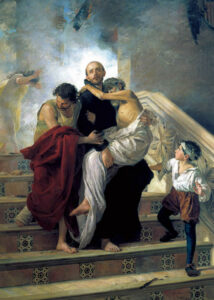Feast Day: March 10th
You would think the name John “of God” would set you apart from just your average João (Portuguese version of the name John), but there are at least 5 different famous men who have that tremendous title: a Portuguese actor from the first half of the 20th century; a professional soccer player, now a coach for the Benfica football club in Lisbon; a disgraced Brazilian psychic; an impulsive 14th century runaway who drifted from shepherd, to soldier, to deserter, to adventurer, to book-seller, and capped off all this with a nervous breakdown; and finally one of Portugal’s great, if absent-minded, poets from the 19th century.
Which one do you think was canonized a saint?
In this case, it was gentleman #4: the rash-boy-turned-shepherd, then soldier-turned-deserter, then African-adventurer-turned-book-seller. He had abandoned his parents (his mother died of grief; his father sorrowfully entered the Franciscans), and then left behind the shepherd who had adopted him and taught him that trade, even offering his daughter’s hand in marriage to the young John, (who would rather live the life of revelry of a soldier). He was found guilty of dereliction of duty and was thrown out of the army a few years later (though perhaps he was framed by jealous comrades? Some accounts say he had some kind of conversion at this time and they did not appreciate his newfound disapproval of drunkenness and profligacy.) In any case, he went back to shepherding … and then various other military expeditions … and then back to shepherding again … and then became the servant of a noble family being exiled to Africa.
So, there he was in Morocco, nursing back to health the family that had been disgraced and rejected as they arrived in this far-flung Portuguese colony, watching his fellow servants run off to become Muslim and abandon their faith, and this good family, for glory or riches or something that might await them there. And then, I suppose, it hit him. He had done that exact same thing. He had abandoned his family, and faith in everything but name, jumping from thing to thing, hoping that something would fix the itch he had for adventure, or money, or stability, or nobility, or friendship, or whatever was the latest ambition that crossed his heart.
And now he was a middle-aged man that had still not figured out what life was about. He had finally gotten hungry, and disillusioned, and a little bit of repentance sank into that prodigal’s heart, just enough openness that God could intervene. One day John had a vision of the Infant Jesus, and received from Our Lord the surname “of God” (not unlike calling a fatherless man “Father-of-multitudes”, or an impetuous fisherman “the Rock”, I suppose…), Who also told him “Granada will be your cross.” He was heading back to Spain!

First, it was a simple call to sell devotional and chivalric books (much different from his earlier interests I suspect, and also different because moveable type had been invented just a handful of decades prior). But then, after a sermon by St. John of Ávila, John of God had what most would call a mental-breakdown (wild acts of repentance, public self-beatings, complete collapse from grief and sorrow). He was incarcerated as a mad-man, beaten and chained, and only released when the good John of Ávila advocated for him. It would take time, but gradually the great saint taught John how to turn his insensitive impulsivity into zeal for charity, his tendency to abandon into self-abandonment and complete availability to the poor, and his self-serving adventuring into the tenacity he needed to continue upon the hard road of learning to love (most avoided him, still seeing him as crazy and dangerous). It was in this that he finally found peace.
Some came to slowly to follow him, eventually forming a community who would dedicate their lives not to riches or glamor or adventure or impulsivity, but the simple and humble task of loving those worst off, especially the mentally handicapped. John would die at the age of 55, teaching us all that no matter what crazy path a life may take, charity can win out in the end, and Christ can convert any heart! His order continues the mission to this day, technically called the Hospitaller Order of the Brothers of St. John of God, but more commonly, and fondly, known as the Fatebenefratelli, the Do-Good-Brothers.
We would all find God in that.
– Fr. Dominic Rankin has never ran into a burning building, or out of one, come to think of it. Though there was that time when the fire alarms went off in the airport in Rome and no one batted an eye as they blared away for 10 minutes before his flight… But St. John of God did run straight into a burning hospital, actually the same one where he was beaten and chained those years before, saving all the patients and then beds and whatever else he could throw out the windows. Turns out, God did not have in mind martyrdom for him because as the building collapsed in an inferno of blazing timber, the gutsy saint walked out just fine.